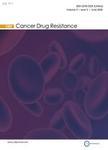Cell-mediated and cell membrane-coated nanoparticles for drug delivery and cancer therapy
作者机构:Department of BioengineeringUniversity of Texas at ArlingtonArlingtonTX 76010USA Joint Bioengineering ProgramUniversity of Texas Southwestern Medical CenterDallasTX 75235USA
出 版 物:《Cancer Drug Resistance》 (癌症耐药(英文))
年 卷 期:2020年第3卷第4期
页 面:879-911页
学科分类:1002[医学-临床医学] 100214[医学-肿瘤学] 10[医学]
基 金:This work was partially supported by the National Institute of Health Award(T32 HL134613,KTN) Yaman S was supported by the Turkish Ministry of National Education
主 题:Cell membrane-based drug delivery cell-mediated drug delivery membrane receptors drug carriers cancer drug resistance nanoparticles
摘 要:Nanotechnology-based drug delivery platforms have been developed over the last two decades because of their favorable features in terms of improved drug bioavailability and *** recent advancement in nanotechnology platforms,this approach still falls short to meet the complexity of biological systems and diseases,such as avoiding systemic side effects,manipulating biological interactions and overcoming drug resistance,which hinders the therapeutic outcomes of the NP-based drug delivery *** address these issues,various strategies have been developed including the use of engineered cells and/or cell membrane-coated *** membrane receptor profiles and characteristics are vital in performing therapeutic functions,targeting,and homing of either engineered cells or cell membrane-coated nanocarriers to the sites of *** this context,we comprehensively discuss various cell-and cell membrane-based drug delivery approaches towards cancer therapy,the therapeutic potential of these strategies,and the limitations associated with engineered cells as drug carriers and cell membrane-associated drug ***,we review various cell types and cell membrane receptors for their potential in targeting,immunomodulation and overcoming drug resistance in cancer.



